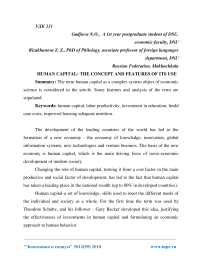Human capital: the concept and features of its use
Автор: Gadjieva N.O., Rizakhanova Z.Z.
Журнал: Экономика и социум @ekonomika-socium
Рубрика: Основной раздел
Статья в выпуске: 12 (55), 2018 года.
Бесплатный доступ
The term human capital as a complex system object of economic science is considered in the article. Some features and analysis of the term are stipulated.
Human capital, labor productivity, investment in education, heald care costs, improved housing adequate nutrition
Короткий адрес: https://sciup.org/140241040
IDR: 140241040
Текст научной статьи Human capital: the concept and features of its use
The development of the leading countries of the world has led to the formation of a new economy - the economy of knowledge, innovation, global information systems, new technologies and venture business. The basis of the new economy is human capital, which is the main driving force of socio-economic development of modern society.
Changing the role of human capital, turning it from a cost factor in the main productive and social factor of development, has led to the fact that human capital has taken a leading place in the national wealth (up to 80% in developed countries).
Human capital-a set of knowledge, skills used to meet the different needs of the individual and society as a whole. For the first time the term was used by Theodore Schultz, and his follower - Gary Becker developed this idea, justifying the effectiveness of investments in human capital and formulating an economic approach to human behavior.
Initially, human capital was understood to be a combination of investments in the individual, enhancing his or her ability to work , education and professional skills. In the future, the concept of human capital has expanded significantly. Recent calculations made by experts of the world Bank, include consumer spending-household spending on food, clothing, housing, education, health, culture, as well as government spending on these purposes.
Human capital includes a stock of health, knowledge, abilities, capitalized under the following conditions:
-
1) cumulative stock of abilities of the person ;
-
2) reasonable use of abilities, which leads to an increase in productivity;
-
3) the increase in labor productivity leads to employee's salary increase;
-
4) the increase in income motivates the employee to make additional investments in their human capital.
Human capital is a certain stock of health, knowledge, skills, abilities, motivations formed as a result of investments and accumulated by a person, which are expediently used in the process of labor, contributing to the growth of his productivity and earnings.
The formation of human capital is still one of the disputing issues. The formation of human capital should be investigated as a process of search, renewal and improvement of high-quality characteristics of a person. Factors that influence the formation of human capital can be combined into the following groups:
-
1) socio-demographic,
2)institutional,
-
3) integration,
-
4) social and mental,
-
5) environmental,
-
6) economic, industrial,
-
7) demographic,
-
8) socio-economic.
Thus we can conclude that the category of human capital is a complex system object of economic research.
Recognized assets of individual human capital (patents, author's certificates, know-how, etc.), branded intangible assets (trademarks/ signs, trade secrets, etc.), organizational capital, structural capital, brand capital and social capital play a vital role in the capital structure of the company. National human capital includes social, political capital, national intellectual priorities, national competitive advantages and the natural potential of the nation.
Man, being a physical being, at the same time is a social being, therefore it is impossible to place a person to economic categories.
Physical capital is a category that refers to buildings, machinery, equipment used for the production of goods and services. Physical capital, when combined with labour, becomes a factor of production that is used to create goods and services, including new capital. It turns out that the most important feature of capital is that it itself is a product of production.
Human capital as a product of production is knowledge, skills that a person acquires in the process of training and employment, and like any other type of capital, has the ability to accumulate.
Human capital occupies a leading place among the competitive advantages of the enterprise, which means that the analysis and evaluation of personnel is the most important condition for the successful leadership of any organization. Without investment in staff, it is impossible to ensure competitive advantages.
инвестиций в персонал, обеспечение конкурентных преимуществ невозможно.
Список литературы Human capital: the concept and features of its use
- Adamchuk V.V., Romashov O.V., Sorokina M.E. Economics and sociology of labor: Textbook for universities. -M., 2008.
- Klochkov V.V. Human capital and its development. -M., 2008.
- Korchagin Yu.A. Human capital and development processes at the macro and micro levels. -Voronezh, 2010.
- Labor economics (social and labor relations). Textbook/Under ed. ON. Volgina, Yu.G. Odegov. -M., 2009.
- Lyskov A.F. Human capital: the concept and the relationship with other categories//"Management in Russia and abroad." -№6. -2009, pp. 3-11.


